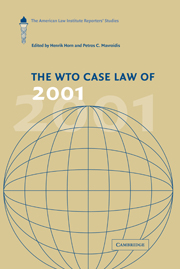Book contents
- Frontmatter
- Contents
- Foreword
- A note on the American Law Institute
- List of reporters
- 1 Introduction
- 2 EC – Asbestos European Communities – Measures Affecting Asbestos and Asbestos-Containing Products
- 3 US – Shrimp United States – Import Prohibition of Certain Shrimp and Shrimp Products, Recourse to Article 21.5 of the DSU by Malaysia
- 4 US – Lamb United States – Safeguard Measures on Imports of Fresh, Chilled or Frozen Lamb Meat from New Zealand and Australia: What Should Be Required of a Safeguard Investigation?
- 5 EC – Bed Linen European Communities – Anti-Dumping Duties on Imports of Cotton-Type Bed Linen from India
- 6 Mexico – Corn Syrup Mexico – Anti-Dumping Investigation of High Fructose Corn Syrup from the United States, Recourse to Article 21.5 of the DSU by the United States
- 7 Argentina – Ceramic Tiles Argentina – Definitive Anti-Dumping Measures on Imports of Ceramic Floor Tiles from Italy
- 8 US – Lead and Bismuth II United States – Imposition of Countervailing Duties on Certain Hot-Rolled Lead and Bismuth Carbon Steel Products Originating in the United Kingdom: Here Today, Gone Tomorrow? Privatization and the Injury Caused by Non-Recurring Subsidies
- 9 US – Export Restraints United States – Measures Treating Export Restraints as Subsidies
- 10 Canada - Dairy Canada – Measures Affecting the Importation of Dairy Products and the Exportation of Milk
- 11 US – Section 110(5) Copyright Act USt – Section 110(5) of the US Copyright Act, Recourse to Arbitration under Article 25 of the DSU: Would've or Should've? Impaired Benefits due to Copyright Infringement
- Index
1 - Introduction
Published online by Cambridge University Press: 06 July 2010
- Frontmatter
- Contents
- Foreword
- A note on the American Law Institute
- List of reporters
- 1 Introduction
- 2 EC – Asbestos European Communities – Measures Affecting Asbestos and Asbestos-Containing Products
- 3 US – Shrimp United States – Import Prohibition of Certain Shrimp and Shrimp Products, Recourse to Article 21.5 of the DSU by Malaysia
- 4 US – Lamb United States – Safeguard Measures on Imports of Fresh, Chilled or Frozen Lamb Meat from New Zealand and Australia: What Should Be Required of a Safeguard Investigation?
- 5 EC – Bed Linen European Communities – Anti-Dumping Duties on Imports of Cotton-Type Bed Linen from India
- 6 Mexico – Corn Syrup Mexico – Anti-Dumping Investigation of High Fructose Corn Syrup from the United States, Recourse to Article 21.5 of the DSU by the United States
- 7 Argentina – Ceramic Tiles Argentina – Definitive Anti-Dumping Measures on Imports of Ceramic Floor Tiles from Italy
- 8 US – Lead and Bismuth II United States – Imposition of Countervailing Duties on Certain Hot-Rolled Lead and Bismuth Carbon Steel Products Originating in the United Kingdom: Here Today, Gone Tomorrow? Privatization and the Injury Caused by Non-Recurring Subsidies
- 9 US – Export Restraints United States – Measures Treating Export Restraints as Subsidies
- 10 Canada - Dairy Canada – Measures Affecting the Importation of Dairy Products and the Exportation of Milk
- 11 US – Section 110(5) Copyright Act USt – Section 110(5) of the US Copyright Act, Recourse to Arbitration under Article 25 of the DSU: Would've or Should've? Impaired Benefits due to Copyright Infringement
- Index
Summary
The project
This is the first annual report of the American Law Institute (ALI) project Principles of Trade Law: The World Trade Organization. The project's object of study hardly needs any motivation. The World Trade Organization (WTO) Agreement is one of the most extensive international agreements ever. With 145 Members, ranging from the poorest to the richest countries on the globe, the Agreement covers the vast majority of international commerce in goods and services, and also contains an agreement on the protection of intellectual property.
The WTO contract contains a rarity in international relations – a compulsory third-party adjudication clause – embodying the idea that trade conflicts should be resolved through multilateral adjudication rather than through unilateral actions. As is the case with many contracts, many of the terms in the WTO Agreement are opaque, leaving much discretion to adjudicating bodies to determine the actual content of the obligations. The case law thus provides more than a mechanical execution of clear-cut rules.
The WTO contract and its interpretation by the WTO adjudicating bodies are subject to intensive policy debate, conducted largely by politicians and non-governmental organizations. There is also an ongoing debate among trade law practitioners and legal scholars concerning the appropriate interpretation of the law. Academic economists, on the other hand, with some notable exceptions, very rarely intervene in these discussions.
The aim of this project is to bridge this divide by providing systematic analysis of WTO law based in both Economics and Law.
- Type
- Chapter
- Information
- The WTO Case Law of 2001The American Law Institute Reporters' Studies, pp. 1 - 13Publisher: Cambridge University PressPrint publication year: 2004

